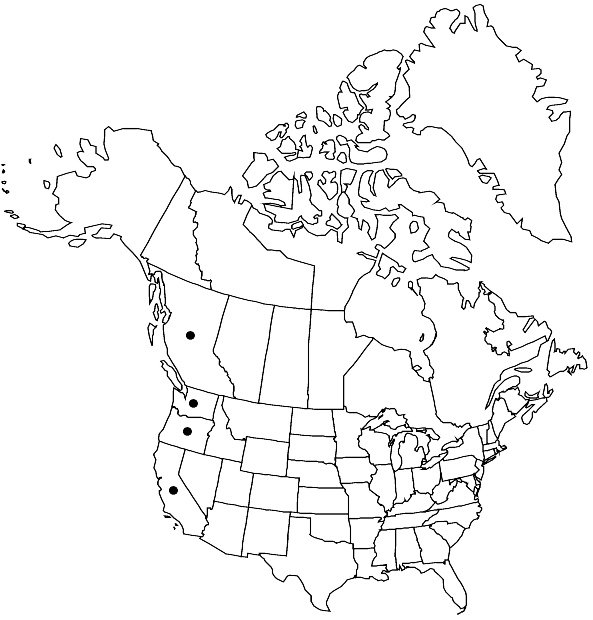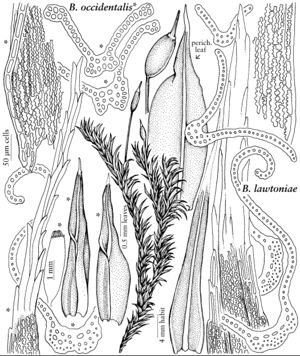Bucklandiella occidentalis
in R. Ochyra et al., Cens. Cat. Polish Mosses, 146. 2003,.
Plants fairly robust, rigid and coarse, in loose tufts or patches, olive green distally, brown proximally. Stems 2–4 (–8) cm, erect-ascending to erect or prostrate, sparingly irregularly branched. Leaves erect-appressed when dry, erect-spreading to patent when moist, straight to slightly curved, narrowly lanceolate, (2.2–) 2.8–3.5 (–3.8) × 0.5–0.8 mm; margins variously recurved on both sides to 1/2–3/4 of the way up the leaf, lumpy and wavy, 2-stratose distally in 1–2 (–4) cells rows, occasionally with 3–4-stratose spots, variously 1–2-stratose in the proximal portion; pilose, awns hyaline, 0.3–0.8 µm, terete, erect, slightly flexuose to recurved when dry, sharply spinulose-denticulate, not decurrent; costa percurrent, in transverse-section strongly convex on the abaxial side, distinctly asymmetric in outline, with a more or less continuous central abaxial groove and with indistinct lateral furrows in places, (60–) 70–90 (–110) µm wide in the proximal portion, (40–) 45–65 µm wide near the apex, 3–5-stratose in the base with (2–) 3–4 (–5) adaxial cells, 3–4-stratose with 2–4 adaxial cells in the median part and 2–3-stratose distally with 2–3 adaxial cells; laminal cells smooth, 1-stratose with occasional 2-layered strands; basal laminal cells elongate, 25–60 × 8–10 µm, nodulose-sinuose; alar cells slightly differentiated; medial and distal laminal cells quadrate to rectangular, 9–25 × 8–10 µm, usually becoming oblate at the margins. Inner perichaetial leaves undifferentiated, lanceolate, pilose. Seta yellowish-brown to brown, 4–7 mm. Capsule brown, weakly lustrous to dull, narrowly ovoid to cylindric, somewhat wrinkled, 1–3 × 0.4–0.6 mm; operculum conical-rostrate, with a straight or somewhat oblique beak; peristome teeth lanceolate, 310–550 µm, brown, papillose, imperfectly split distally into 2 prongs or only perforated, arising from a low basal membrane, 20–35 µm high. Spores 12–17 µm.
Habitat: Dry or fairly moist acidic rocks, boulders and outcrops
Elevation: low to high elevations (0-1600 m)
Distribution

B.C., Calif., Oreg., Wash.
Discussion
Bucklandiella occidentalis occurs from Vancouver Island and southern British Columbia to central California. The species is readily identified by its costa asymmetric and somewhat winged due to the presence of a shallow furrow on its abaxial side in the distal half. This is a unique feature, unknown in other species of the genus. Moreover, the leaf margin is wavy and lumpy in the distal portion, and the hyaline awn is terete and sharply spinulose-denticulate; this is a rather exceptional type of hair-point in this genus. Bucklandiella heterosticha has a flattened and very broad awn, 1-stratose leaf margins, broadly canaliculate leaves, and symmetric, not winged costae; it is unlikely to be mistaken for B. occidentalis. Likewise, B. affinis has an awn similar to that in B. heterosticha and, additionally, it differs from B. occidentalis in its broader leaves, 1-stratose leaf margins, and entirely different costal anatomy. Bucklandiella lawtoniae shares with B. occidentalis wavy and lumpy leaf margins and sharply denticulate awns that, however, are flattened, not terete, and distinctly erect-recurved to squarrose. Moreover, it has completely 1-stratose leaf margins and symmetric, reniform costa in the proximal portion, and lacks a basal marginal border. Bucklandiella sudetica is much less robust than B. occidentalis and has smooth leaf margins, flat and less denticulate awns, and symmetric costa.
Selected References
None.
Lower Taxa
"um" is not declared as a valid unit of measurement for this property.
